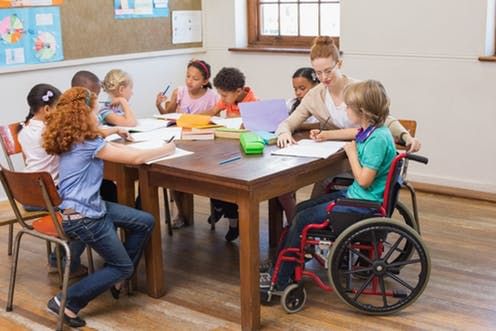Stereotypes And Negative Attitude Towards Disabled People!
Negative stereotypes and attitudes linked to disability-
The medical or individual model of disability has negatively affected the way persons with disabilities are treated in their communities, at job sites (for those who are fortunate to be employed), and in educational milieu. This model sees people with disabilities as patients or sick people and also sees disability as an individual problem that needs to be cured by the individual himself.
Historically, people with disabilities have been stereotyped in many different ways. Some of the stereotypes used to label people with disabilities persist in the mind of the public today. Incomplete information, mistaken perceptions, isolation and segregation have perpetrated many of these stereotypes.
The way people think about disability affects the care and education of PWDS. Myths and misconceptions about disability are common. Promoting negative images of disability is a form of discrimination because it creates barriers to full citizenship for people who have a disability. There are many stereotypes or images associated with PWDS and these stereotypes labeled on PWDS have had very negative influences on the way they are educated. Some stereotypes of disabled people portray them as being: pitiable and pathetic, sinister or evil, tragic but brave, laughable, aggressive, burdens/outcasts, non-sexual and incapable of fully participating in everyday life.
The following are some common attitudes and stereotypes that emerge repeatedly in our societies and communities:
1. People with disability deserve pity:
Disability is seen by many people as a personal tragedy and so disabled people deserved to be pitied. Pwds are often viewed as tragic figures whom society should pity. According to them, the burden of disability is unending; life with a disabled person is is a life of constant sorrow and agony and that the able-bodied stand under a continuing obligation to help them. People with disabilities and their families are the most perfect objects of charity and their and their role is to inspire benevolence in others, to awaken feelings of kindness and generosity. Unfortunately, contrary to what many might think, disability does not mean a poor quality of life, it is often the negative attitudes of society and the lack of accessibility within the community that are the real tragedy.
2. People with disability cannot lead a productive and fulfilling life:
According to this stereotype, it is assumed that disabled people cannot have a good “quality of life”. It promotes the assumption that people with disabilities will not be able to have a family, get a good job or take on responsibilities. The focus still remains continually on the person’s impairment rather than on the person’s abilities.
People with disabilities are capable of participating fully in community life just like their non-disabled peers. The challenge is to focus on their abilities, not on their limitations.
3. People with disabilities are sick and in constant pain:
Many people see PWDS as being under constant agony and pain. They see disability as a sickness that needs to be fixed, an abnormality to be corrected or cured. But it should be noted that people with disabilities are like people without disabilities, they get sick on occasion or sometimes may be in pain.
4. People with disability are wheelchair bound:
Many people still assume that the wheelchair is a source of life for PWDS without which they cannot live a fulfilling life.
Unfortunately, PWDS typically do not view themselves as “confined to their wheelchair”. In the same way, a person without a disability is not described as confined to their car, so also a disabled person is not supposed to be confined to their wheelchair. A wheelchair, like an automobile, is a form of mobility that contributes to a person’s independence.
5. People with disabilities are brave, courageous, heroic and inspirational for living with their disability.
Pwds are often portrayed as superhumans and courageous as they triumph over adversity.
This stereotype puts a lot of pressure on disabled people to be cheerful, accepting and ready to “make the most of their condition”. The impairment gives disabled persons a chance to exhibit virtues they did not know they had and teach the rest of us patience and courage. George Covington, a writer who is blind once said that; “we’re seen as inspirational, and inspiration sells like hotcakes. My disability isn’t a burden: having to be so damned inspirational is”. This stereotype does not allow for people to have complex emotions and sees disabled people as being different rather than ordinary.
6. People with disabilities are helpless and dependent.
This stereotype tends to mean that PWDS are to be pitied as they spend their whole life depending on and needing other people’s help. Traditionally this stereotype was used by charities in order to raise funds.
7. People with disabilities are to be feared:
Traditionally, PWDS have always been associated with witchcraft. Many people feel that disability is a sign of ill omen to be feared. This sometimes explains why a lot of hatred, suspicion and violence is associated with disability. They are seen as a menace to others, to themselves and to their community. This is especially true of people with mental disabilities. Pwds are consumed by an incessant and inevitable rage and anger at their loss and at those who are not disabled. Those with mental disabilities lack the moral sense that would restrain them from hurting others.
It should be noted that the above stereotypes and attitudes have been carved out by the society that continues to exclude persons with disabilities from meaningful participation in the development processes of their respective communities.
Let’s all create an inclusive society for all persons, irrespective of their abilities and disabilities.



+1.svg)
